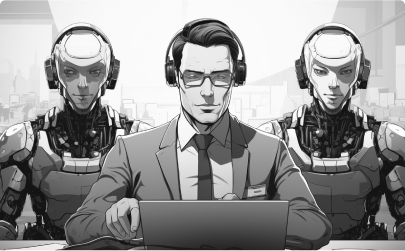Introduction
AI Agents are one of the most exciting developments in automation and AI for businesses in 2025. But for many business owners, terms like 'agentic AI' or 'multi-agent systems' still sound like buzzwords.
Are they just smarter chatbots? Are they too complex for small and medium businesses? And what can they actually do for you?
This guide breaks it all down in plain language and shows how tools like One Stop Agents make this technology accessible, powerful, and ready to scale.
What Is an AI Agent?
An AI Agent is a smart software assistant that can understand your instructions, make decisions, and take action — all without needing a human to walk it through every step.
| Task | Without AI Agent | With AI Agent |
|---|---|---|
| Answering FAQs | A chatbot replies with pre-set answers only when asked. | A support agent searches your documentation, customizes the answer, and offers a next step. |
| Scheduling | A form lets you pick a time and sends a confirmation. | An agent checks your calendar, suggests options, sends the invite, and follows up. |
| Lead follow-up | A CRM shows who to follow up with. | A sales agent filters high-intent leads, sends a tailored message, and books a call. |
An AI Agent turns one task into a complete workflow — just like a digital employee would.
What Is Agentic AI?
Agentic AI refers to the type of intelligence behind the agent.
It means the AI has a degree of autonomy — it can decide how to act in order to reach a human-defined goal, even if the path isn't explicitly given.
| Tool | Agentic AI |
|---|---|
| A booking form waits for you to select a time and submit. | A scheduling agent checks your calendar, proposes a time, sends the invite, and follows up if there's no reply. |
| A dashboard shows sales data when you log in. | An agent monitors sales trends, detects a dip, and alerts you — or even suggests a campaign. |
| A chatbot gives a scripted answer when asked. | An agent can ask follow-up questions, check a database, and decide how to solve the issue. |
Agentic AI turns your AI from passive to proactive.
What Are Multi-Agent Systems (MAS)?
A Multi-Agent System (MAS) is when several AI Agents work together like a team — each with their own job, knowledge, and instructions.
Each AI Agent:
| Role | Description |
|---|---|
| 🎯 Has a specific goal | e.g. support, logistics, HR, or sales |
| 📂 Uses its own data and tools | like documents, APIs, or connected systems |
| 📝 Follows its own instructions | based on context, goals, and boundaries |
But the real value comes when they collaborate:
| Example Task | MAS Coordination |
|---|---|
| A customer asks about a delayed order | The <b>Support Agent</b> asks the <b>Inventory Agent</b> to check stock, then asks the <b>Logistics Agent</b> for delivery status, and finally the <b>Policy Agent</b> for compensation rules. |
| Running a marketing campaign | The <b>Content Agent</b> writes emails, the <b>Marketing Agent</b> schedules them, and the <b>Sales Agent</b> follows up on interested leads. |
MAS gives you a network of smart agents working together — like your own digital departments.
Real-World Examples: AI Agent vs. Agentic AI vs. Multi-Agent Systems
1. 🧑💻 AI Agent = The Digital Worker
An AI Agent is a software assistant built for one specific task or function. It performs actions based on given instructions, without needing to be asked each time.
Example 1 — Customer Support Agent: Answers FAQs, tracks orders, and provides return instructions via your website chat — automatically, 24/7.
Example 2 — Meeting Scheduler Agent: Reads your calendar, proposes available slots, sends invitations, and sends reminders — no human needed.
Think of it as a single-function employee who handles a repetitive task consistently and without breaks.
2. 🧠 Agentic AI = The Smart Decision-Maker
Agentic AI describes the capability of an AI system to think independently, make decisions, and act toward a goal — even in new or changing situations.
Example 1 — Sales Agent with Initiative:
- Analyzes each lead's behavior (e.g. clicks, time on page)
- Decides which message fits best
- Sends the right email
- Schedules a call if engagement is high
- Flags unusual cases for review
Example 2 — Proactive Support Agent:
- Detects negative sentiment in a customer message
- Escalates the issue to a human
- Sends a proactive apology — all without being told to do so
Think of this as giving your AI employee a brain — so it doesn't just follow rules, but actually reasons and acts to reach the goal.
3. 🤝 Multi-Agent System (MAS) = The Digital Team
A MAS is a system where multiple AI Agents — each with their own job — collaborate to solve a bigger, more complex task.
Example 1 — E-commerce Customer Question:
- Support Agent receives the message
- It checks with the Inventory Agent to confirm stock
- Then asks the Logistics Agent for shipping status
- Finally, asks the Policy Agent if a refund is allowed
- Sends the full, accurate response back to the customer
Example 2 — Marketing Funnel Automation:
- Content Agent writes a blog
- Marketing Agent schedules social media posts
- Analytics Agent tracks engagement
- Sales Agent follows up with readers who clicked links
Think of MAS as your full AI team, where each 'employee' has a role and they work together across departments.
Summary Table
| Concept | What It Means | Example Role |
|---|---|---|
| AI Agent | A software assistant for a specific task | Answering support tickets |
| Agentic AI | Intelligence that allows autonomy and action | Deciding which leads to follow up |
| Multi-Agent System | A team of agents working together | Coordinated customer service + logistics |
Why Use AI Agents?
AI Agents give SMBs access to enterprise-level automation and intelligence:
- 24/7 Availability — Agents never take breaks — they support your customers and systems all day, every day.
- Fewer Errors — They follow rules and steps consistently — perfect for repetitive tasks like data entry or order processing.
- Save Time and Money — Offload routine work to agents so your team can focus on strategy, sales, or creative work.
- Scale Easily — Need more support? Don't hire — just launch another agent with a new focus.
- Professional Experience — Even a small business can offer high-quality, fast responses and workflows like a much larger team.
Limitations to Keep in Mind
AI Agents are powerful, but they aren't magic. They still have limits:
- They need quality data — Garbage in = garbage out.
- They need clear goals — Vague instructions can lead to confusion.
- They aren't humans — No empathy, no creativity, no gut feeling.
That's why One Stop Agents lets you test, monitor, and refine your agents easily.
In critical areas like legal or financial decisions, always keep a human-in-the-loop for review.
Final Thoughts
AI Agents aren't just smarter chatbots — they are independent, goal-driven helpers who can truly manage part of your business.
With One Stop Agents, you can:
- Build your own AI agents (no coding)
- Give them access to knowledge and tools
- Let them work for you 24/7
- Connect them into a scalable system
Whether you're looking to support customers, automate back-office tasks, or build out a digital team — this is your opportunity to start.
You don't need an AI department. You just need a vision, a workflow, and One Stop Agents.
👉 Ready to start? Create your first agent today with One Stop Agents.



